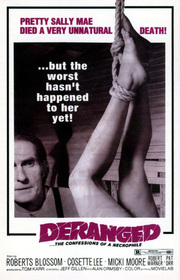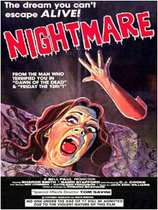Our editor-in-chief Nate Yapp is proud to have contributed to the new book Hidden Horror: A Celebration of 101 Underrated and Overlooked Fright Flicks, edited by Aaron Christensen. Another contributors include Anthony Timpone, B.J. Colangelo, Dave Alexander, Classic-Horror.com's own Robert C. Ring and John W. Bowen. Pick up a copy today from Amazon.com!
Deranged (1974)
There is rarely a more compelling group of historical figures, at least to much of humanity, than those serial killer folk. People have a certain fascination with the likes of real-life murderers such as Jack the Ripper, Ed Gein or Jeffrey Dahmer. Even in the fictional realm of horror films, the serial killer is often the most popular of antagonists. Why are we so drawn to them? Maybe it's our compulsion for all things bloody, like when we put the brakes on the car to watch the road accident with injuries. Or maybe it's the fact that some of these folks were physically and emotionally abused as children, as was the case with Gein, and we find a basic compassion because of it.
Now, it would be hard enough to make a horror movie where the audience is asked to connect with the villain if he or she sticks merely to bloody butchering. Throw in some necrophilia, and it becomes a whole new level of difficulty. Deranged, from Karr International Pictures, delves into that subject in addition to offering both a thinly-disguised take on Ed Gein and his exploits as well as an exploration of the theme of compassion for the killer.
The film stars Roberts Blossom as Ezra Cobb, a Wisconsin farmer who cares for his domineering, bed-ridden mother. Like Gein, Cobb suffers repeated mental and physical abuse from his religious fanatic mother. Ma Cobb is Ezra's own personal demon ready to order. She hates women and imparts such delightful words of advice to Ezra as "Remember what I've always told you. The wages of sin is gonorrhea, syphilis, and death!" Ezra has been so mentally whipped by Ma over the years that he's become a charter member of the psycho momma's boy brigade. When Ma dies, Ezra misses her so badly he begins to see and hear her. Things really get interesting when he takes up grave-robbing and digs up her corpse to keep him company. Then he decides that decaying old Ma needs company and searches other cemeteries for friends. It doesn't take long for Ezra to move to hunting live victims to appease Mama, including a local barmaid, a family friend, and a hardware store clerk.
The jewel of this piece is the rare star turn by Blossom, an actor mainly known for smaller, eccentric character roles. His Cobb is equal parts sympathetic and psychotic. Using a slightly hunched posture, slow gait, and pronounced drawl, he presents Cobb as someone who's been so emotionally battered by the personal demon that is his mom, he needs to kill in a twisted way to both gain her approval and keep her at bay at the same time. At the same time, the constant verbal abuse Ezra has received over the years has caused a monstrous mixture of cruelty, sadism, and hatred of women. Blossom offers glimpses of this dark side of Cobb through blank-eyed stares and a line delivery punctuated with well-timed dramatic pauses. It's as if Cobb is still deciding what grotesque thing he wants to do to his victims even as he is still catching up to them. He is a live grenade that can go off at any time. Blossom walks the tightrope here between flawed man and malignant creature seemingly effortlessly.
Directors Alan Ormsby and Jeff Gillen utilize bits of dark humor and an array of gleefully eccentric supporting characters to show a delightfully off-kilter view of Ezra's world. There's the hunt-loving father and son neighbors who are blithely unaware of Ezra's grisly sideline job, the family lady friend who mourns her dead husband but will have sex with Ezra if her late husband gives the okay through a séance, the thick-headed sheriff and the elderly, drunk barfly who keeps talking about his failing sex organ. With an ample supply of oddballs to choose from for his murder escapades, Cobb sees himself as the ordinary guy who feels he must become something of a grim defender of twisted, religious righteousness, eliminating those who meet his definition of sinner.
Credit should also go to Jack McGowan's cinematography, expertly combining use of shadows, muted indoor light, snowy exteriors, lingering close-ups, and lengthy camera pans to present Ezra's world as one of utterly bleak emptiness. He uses daylight and snowbound location shooting to add a creepy air to the stalking and murder of the hardware store clerk. McGowan takes a different approach when it comes to Ezra's bludgeoning of the barmaid in his home and the grotesquerie of the rotting skeletons seated in grim, last supper fashion at Cobb's dinner table. Incorporating shadows and artificial light for somber, oppressive mood while letting the camera become slightly static to take in every macabre detail, McGowan paints an eerily vivid portrait of an unending nightmare.
Deranged is the rare serial killer picture that manages to get the audience to find sympathy in the most difficult to get behind of movie antagonist, a central character whose mental makeup inherently veers them toward enjoying brutality and unrelenting cruelty. It's not your conventional way of filmmaking, but the makers of Deranged wouldn't have it any other way.








